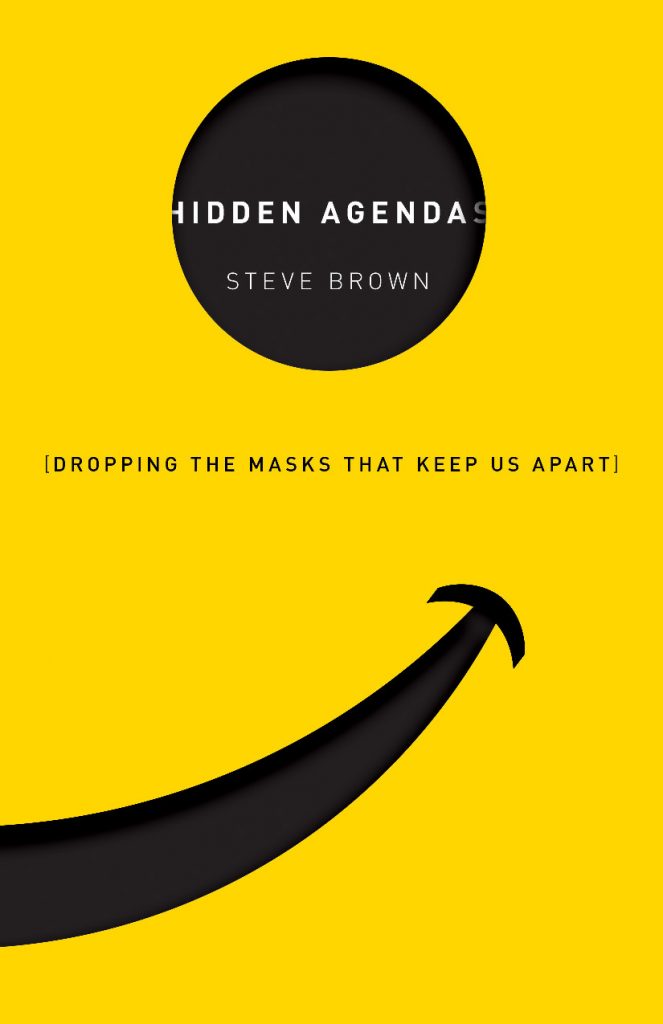I once asked a Jewish friend to forgive the church and me for what we did to Jews in the name of Christ. I waited for him to tell me to get lost or, maybe, to forgive me. Instead, he started weeping. I had no idea why and asked him. “Steve,” he said, “I didn’t hear a ‘kicker’ in your remarks. Often people will say something like what you said to me but there is always a kicker. You guys want me to receive Jesus, get saved, or to ask for forgiveness for what ‘we’ did to Jesus. I waited for the kicker and there wasn’t one. Thank you.”
That conversation is one I’ve thought about a lot. One of the most tragic things about the church is that we have become, as it were, a “church of kickers.” It’s the “Of course God loves you . . . but don’t let it go to your head,” “God will forgive you . . . but don’t do it again,” “God’s your loving Father. . . but don’t forget about the discipline,” or “God loves you . . . but that should make a better person.” I can’t tell you the number of times I’ve brought up Jesus and the woman caught in adultery, his love and forgiveness given to her (John 8:1–11), and people will bring in the kicker: “Yeah, but don’t forget that Jesus told her to ‘sin no more.’” It’s not that there isn’t some truth in those statements. But they sometimes make God’s love and forgiveness so conditional that, frankly, I can’t deal with it. What was meant as good news very quickly becomes bad news because of the kicker.
I have an acquaintance in the billboard business. During the “troubles” in Northern Ireland he wanted to do some- thing about the hatred between Catholics and Protestants. Do you know what he did? He bought billboards across Northern Ireland with one message: “I love you! Is that okay?—Jesus.” That was a powerful message and it wasn’t powerful because Jesus said that he loved them. Everybody knows that. It was powerful because there wasn’t a kicker.
You’re forgiven.
It’s as Simple as That
I know, I know. Your “Pavlovian” response (and mine) is to wait for the kicker. You can keep on waiting because there isn’t one. It doesn’t matter where you’ve been, who you’re sleeping with, what you’re drinking or smoking, what you think, who you’ve hurt, the games you’re playing, the masks you’re wearing, the agendas you’re hiding, or whether or not you get better. When you bring it all to Jesus, you’re forgiven.
Deal with it.
As an aside, the fact that our new name is Forgiven has amazing implications for relationships between Christians and for the masks we wear. The reason Jesus embedded “Forgive us our debts as we forgive those who have sinned against us” in the prayer he taught us is that he knew that without forgiveness at the heart of our relationships, we would continue to play at religion, and never love or be loved.
You can’t forgive until you have been unconditionally forgiven (no kicker) and then you can only love to the degree to which you have been unconditionally forgiven. I will never remove my mask and set aside my agendas as long as I think Christianity is about fixing me and others, building empires, changing the world, making my life count, correcting doctrinal truth, promoting programs, raising money, and being nice. It’s not. It’s about the forgiveness of sins. Paul wrote, “The saying is trustworthy and deserving of full acceptance, that Christ Jesus came into the world to save sinners, of whom I am the foremost” (1 Timothy 1:15). Paul, your name is “Forgiven.”
If you know Jesus, yours is too.
Are there implications to that? Of course there are . . . sometimes. Does it make you a better person? Of course it does . . . sometimes. Does it make a difference in your relationships? Of course it does . . . sometimes. Does it bring you into the stream of compassion and practical ministry to the world? Of course it does . . . sometimes. Does it give you a “burden for souls”? Of course it does . . . sometimes. And sometimes it doesn’t. That’s not the issue. Your name is “Forgiven.” Rejoice and be glad.
But you have other names too. When you’re crucified with Christ . . .
Your Name Is Redeemed
The word “redeemed” is a very strong word. It means to gain or regain something at a price. The Scripture says that in Christ we have been redeemed “through his blood, the forgiveness of our trespasses, according to the riches of his grace, which he lavished upon us” (Ephesians 1:7–8). Again, “For all have sinned and fall short of the glory of God, and are justified by his grace as a gift, through the redemption that is in Christ Jesus” (Romans 3:23–24).
I’m often asked what I do. I never know exactly what to say. Sometimes I say that I’m a preacher, or clergyman, or pastor, or professor, or writer, or broadcaster. There are times when I say that I’m a “religious professional” who “works for God.” A friend of mine told me to stop saying that: “When you work for someone, you have a job as long as there is work to do and you do it well enough to please the boss. But when the day’s work is over, you leave and go back to the house you paid for with the money you earned. Steve, you don’t work for God. You’re his son. When the day is over, you go up to the big house where you live. Try to remember that.”
I do. My name is “Redeemed.” That’s your name too.
But you have other names as well, because when you’re crucified with Christ . . .
Your Name Is Acceptable
Most Christians have a handle on the forgiveness thing. You’re forgiven and then you work hard to be good. It’s all about pleasing God, being faithful, and trying your best to be obedient. It’s hard but we love to quote that “in Christ we can do all things.” In other words, a Christian is for- given and then he or she becomes better and better every day in every way.
What if I told you that God was already pleased, that he already thinks of you as faithful, and in his eyes you are already obedient? It’s true. The theological word is “imputation” and it is so radical, so amazing, and so unbelievable that I have trouble believing it. But God said it and, unless he’s started lying, it’s true.
The Bible says, “. . . and be found in him, not having a righteousness of my own that comes from the law, but that which comes through faith in Christ . . .” (Philippians 3:9).
But there’s one more name. When you’re crucified with Christ . . .
Your Name Is Loved
You should meet my wife Anna. She’s a saint. Very few could live with somebody like me. And just so you know, I’m not being “authentic” or “humble” when I say that. It’s the truth. I can be angry and kind in the same sentence, happy and sad in the same hour, and loving and hateful in the same day. I would be bipolar if either my manic state or my depressive state lasted longer. Anna, on the other hand, is the same yesterday, today, and forever. She is a gift from God and an anchor for this crusty old preacher.
I don’t want to get too detailed here (you’re not that safe) but the other day I called home and my wife wasn’t there. I left a message on our answering machine. I don’t even remember what the message was but I’m almost positive that it included the words, “Love you.” I happened to get home before my wife did and listened to the message I’d left. I was shocked. I sounded ticked, upset, and kind of harsh. When I got home, I told Anna that I had listened to my message (the one intended for her). “I sounded very angry in that message . . . and I was wondering if I always sound like that.” She smiled and I knew. “I’m so sorry,” I told her. “I’m going to be a lot kinder than I have been.” She smiled again and then . . .
. . . she gave me a Baby Ruth.
A Baby Ruth? Yeah, and she’s been doing that for almost all of our adult life. In fact, sometimes I fake bad stuff when I’m hungry, just to get a Baby Ruth. When I yell, forget a birthday or anniversary, do something a preacher ought not do, I get a Baby Ruth. Of course I don’t deserve the Baby Ruth. That’s the point of love. The principle is this: you can’t experience love until it’s given when you don’t deserve it. Everything else is reward.
That’s what God has done. Listen to what Paul writes: “For I am sure that neither death nor life, nor angels nor rulers, nor things present nor things to come, nor powers, nor height nor depth, nor anything else in all creation, will be able to separate us from the love of God in Christ Jesus our Lord” (Romans 8:38–39). I would suggest that those words pretty much cover it. They cover all of our masks and all of our hidden agendas.
Excerpt adapted from Hidden Agendas: Dropping the Masks That Keep Us Apart by Steve Brown. © 2016 by Key Life. Excerpt may not be reproduced without the express written permission of New Growth Press.
Hidden Agendas: Dropping the Masks that Keep us Apart
Deep down, we all have a secret plan for getting from where we are to where we want to be, even if we refuse to admit it to ourselves. And if our hidden agendas aren’t enough, we wear masks to obscure the truth even more. We put on these masks—like religion, appearance, power, politics, or protection—to drive our agendas. But all of this leaves us feeling phony, ashamed, guilty, and afraid.






